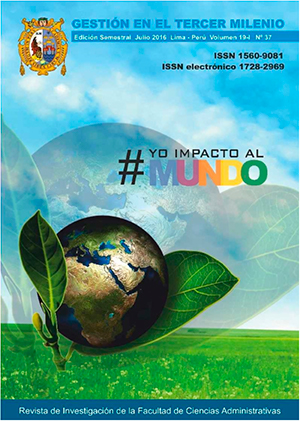Corporate social responsibility: strategic tool for competitiveness of smes incorporated into the value chain of large textile company
DOI:
https://doi.org/10.15381/gtm.v19i37.13775Keywords:
Competitiveness, corporate social responsibility, value chainAbstract
Corporate social responsibility (CSR) is defined as the practices of the company based on ethical values and principles of transparency, which seek to promote the continuous improvement of the relationship between the company and its stakeholders (stakeholders). These segments include its customers, suppliers, partners, customers, the environment, communities, government and society in general. Thus, CSR comprises a wide range of voluntary activities of companies that aim to improve social and environmental performance of them and optimize their competitiveness. The application of Corporate Social Responsibility (CSR) in business has effects on organizational climate, operational performance, innovation and reputation of the companies. The incorporation of SMEs that are part of the value chain of large companies, in implementing CSR, will result in improved operational processes, streamlining of these processes, cost reduction and improved performance environmentally. The large and medium enterprises are responsible to include SMEs in the projects and activities mentioned, given the financial capacity of small businesses, the costs in training and certification would not be viable model of CSR. This application of CSR, however, presents a number of strategic and operational challenges that can be seen as opportunities for development and improvement of business, which require managers to be more creative and responsible, to combine a vision of the company focused on increasing profits and increasing activities on behalf of its suppliers, customers and society. The proposed strategy should encourage and facilitate companies in the textile and clothing sector to generate more jobs, best with large companies and relate to each other, incorporate the best and latest technology, to adapt to the new model of flexible specialization, can use easily financial and nonfinancial services offered to the sector, increase their creativity and generate technological innovations and improve their competitiveness.Downloads
Published
Issue
Section
License
Copyright (c) 2017 Norka Patricia Stuart Alvarado, Andrea Roberta Aráuz Chavez

This work is licensed under a Creative Commons Attribution-NonCommercial-ShareAlike 4.0 International License.
THE AUTHORS RETAIN THEIR RIGHTS:
(a) The authors retain their trademark and patent rights, and also over any process or procedure described in the article.
(b) The authors retain the right to share, copy, distribute, execute and publicly communicate the article published in Gestión en el Tercer Milenio journal (for example, place it in an institutional repository or publish it in a book), with acknowledgment of its initial publication in the Gestión en el Tercer Milenio.
(c) Authors retain the right to make a subsequent publication of their work, to use the article or any part of it (for example: a compilation of their work, lecture notes, thesis, or for a book), provided that they indicate the source. of publication (authors of the work, magazine, volume, number and date).













